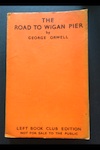A new Left Book Club will launch this autumn in an attempt to revitalise progressive politics in Britain, much as the original LBC did in the 1930s and 1940s.
 Founded in May 1936 and pioneered by Victor Gollancz, Stafford Cripps and John Strachey, the pre-war LBC issued a monthly book choice to members, published a newsletter that became a major political magazine and held an annual rally.
Founded in May 1936 and pioneered by Victor Gollancz, Stafford Cripps and John Strachey, the pre-war LBC issued a monthly book choice to members, published a newsletter that became a major political magazine and held an annual rally.
The club’s aim was to “help in the struggle for world peace and against fascism” and membership reached 57,000 by 1939.
The new publisher intends to start with a list of high-quality political books aimed at a wide readership. Members will receive ‘hot-off-the-press’ titles on the housing crisis, climate change, the European Union, new forms of protest, radical history and many other topical issues.
It is being launched by a collective of activists, writers and trade unionists in partnership with the radical publisher Pluto Press.
“Politically non-aligned and not-for-profit, we believe, as did the organisers of the first Left Book Club in the 1930s, that books, and the discussion of ideas, are vital for the development of progressive politics in Britain,” says the new LBC website.
The first of the LBC’s four annual books will be Syriza: Escaping the Labyrinth, by Kevin Ovenden, followed in 2016 with The Rent Trap, a book on the housing crisis by Samir Jeraj and Rosie Walker, and the award-winning Here We Stand: Women Changing The World, edited by Helena Earnshaw and Angharad Penrhyn Jones.
Members, who will pay an annual subscription of £40, are expected to discuss the books in reading groups or through online forums.
The new LBC director is Roger van Zwanenberg, previously managing director of Pluto Press and Zed Press. He writes: “The creation of the Left Book Club was a unique event. It was the first book club in Britain, the first socialist book club, and its overriding feature was that it brought together all elements of the Left.
“Historically, despite many attempts, no one had ever achieved left unity on such a scale. The book club was more than just a club, it was seen by all who took part as a political movement that stimulated its members to work together for a better future.
“When the first socialist government took power in Britain in 1945, a significant number of senior members of the new government had received their earlier training through the Left Book Club. Ernest Bevin, Herbert Morrison and nine other Left Book Club authors sat in the Cabinet, including the new prime minister.”
 Clement Atlee’s The Labour Party in Perspective was one of the LBC’s earliest publications, as was George Orwell’s The Road to Wigan Pier, while Michael Young’s Labour’s Plan for Plenty was among its post-war titles.
Clement Atlee’s The Labour Party in Perspective was one of the LBC’s earliest publications, as was George Orwell’s The Road to Wigan Pier, while Michael Young’s Labour’s Plan for Plenty was among its post-war titles.
While the original LBC was known for its distinctive orange paperbacks and red hardbacks, the modern version appears to have opted for a black and white design with an orange stripe down the left-hand edge.
Its series of high-quality publications will be available on a subcription basis and in select bookstores at “affordable prices”. The list will be informed by the following considerations:
“Both UK-based and internationalist, drawing on a wide range of political traditions, relevant to the experiences and struggles of ordinary people and their families across the world.
“We hope to cover contemporary global issues, the environmental crisis, British political and social issues, the history of working and oppressed people’s struggles, and progressive political theories.
“We wish to publish works that respond to the intellectual needs of contemporary movements for progressive change, that are relevant to political activism, and that are written in a highly accessible way. At the same time, we wish to maintain the highest standards of intellectual integrity.
“We wish to encourage work by authors from a wide range of backgrounds. We aspire to provide a platform for marginalised voices – those of women, minority groups, and oppressed people.
“LBC titles will be of an accessible length, written in a jargon-free, journalistic style.
“We also plan to include other books in Club lists, by appropriate arrangement with a range of publishers. Our lists will represent a full range of progressive traditions, perspectives, and ideas. It will also include reprints of classic texts where appropriate.
“We hope the books will be used as the basis of reading circles, discussion groups, and other educational and cultural activities relevant to developing, sharing and disseminated ideas for progressive social change in the interests of working people.”
—-



18 November 2015
[…] At the age of 20, she met an Australian sailor who hugely impacted the way she viewed the world: ‘I found him interesting to talk to. He was a socialist and an active member of the Australian Labour Party, he lent me one of Upton Sinclair’s books and we discussed the conditions of working people in our different countries’ (43). Engaging in political conversation with Bill and expanding the type of literature she was reading, meant that Winifred was able to form her own political opinion and begin to pursue her interests in politics. Graves writes: ‘politically aware working-class women responded energetically to the resurgence of a strong political labour movement’ (1994, 36). For Winifred, the ongoing revival of the Labour Party was exciting and she was highly motivated to become involved. Image of Left Book Club sign […]